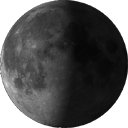Eight of our nine dwarf planets and candidates, to scale, with their moons and our best guess of their colors. The top four are the acknowledged dwarves, the bottom four Brown’s proposed four. Ceres, not shown, is grayish and about the size of Sedna. Image credit: Wikimedia creative commons
One of my favorite shirts honors the brave souls of the former planet Pluto, those billion voices which shouted out in agony and were suddenly silent as the International Astronomical Union’s space station destroyed– wait, no. That’s not what happened to Pluto. Pluto got demoted from the ranks of “planet” to “dwarf planet” a few years ago, much to the dismay of students around the country. But what does that mean, why did it happen, and what are these dwarf planets, anyway? Today I’d like to take you on a tour of some of our Solar System’s smaller inhabitants, and walk you through the strange lands of extreme cold, dark, and quiet on its farthest shores.
What dwarf planets are
Let’s start with the reason Pluto got demoted in the first place. The problem was simple: we kept finding other things in the Solar System which were officially “asteroids,” but which were all about the size of Pluto, or even a bit bigger. It was starting to seem silly to call some of them planets (and give them lots of extra attention) and others not when it was becoming clear that they were all kind of alike. So instead, we defined a new category for them, the “dwarf planets.” By the current census, our Solar System therefore contains four gas giants: Jupiter, Saturn, Uranus, and Neptune; four terrestrial (“rockball”) planets: Earth, Venus, Mars, and Mercury; and five dwarf planets: Eris, Pluto, Makemake, Haumea, and Ceres. And there are actually many more; the census of dwarf planets is only beginning. Astronomers estimate that there are between one and two hundred dwarf planets orbiting our sun. Mike Brown of Caltech, one of the foremost experts in this field, lists four more that are likely to be added to the list soon: 2007 OR-10, Quaoar, Sedna, and Orcus. (Yes, one of these still needs a name.)


